
Sir William Crookes was an English chemist and physicist who attended the Royal College of Chemistry, now part of Imperial College London, and worked on spectroscopy. He was a pioneer of vacuum tubes, inventing the Crookes tube, which was made in 1875. This was a foundational discovery that eventually changed the whole of chemistry and physics.

John Barrymore was an American actor on stage, screen, and radio. A member of the Drew and Barrymore theatrical families, he initially tried to avoid the stage, and briefly attempted a career as an artist, but appeared on stage together with his father Maurice in 1900, and then his sister Ethel the following year. He began his career in 1903 and first gained attention as a stage actor in light comedy, then high drama, culminating in productions of Justice (1916), Richard III (1920), and Hamlet (1922); his portrayal of Hamlet led to him being called the "greatest living American tragedian".

John Brougham was an Irish and American actor, dramatist, poet, theatre manager, and author. As an actor and dramatist he had most of his career in the United States, where he was celebrated for his portrayals of comic Irish characters.

Edwin Thomas Booth was an American stage actor and theatrical manager who toured throughout the United States and the major capitals of Europe, performing Shakespearean plays. In 1869, he founded Booth's Theatre in New York. He is considered by many to be the greatest American actor of the 19th century. However, his achievements are often overshadowed by his relationship with his younger brother, actor John Wilkes Booth, who assassinated the 16th president of the United States, Abraham Lincoln.

William Charles Macready was an English stage actor. The son of Irish actor-manager William Macready the Elder he emerged as a leading West End performer during the Regency era.
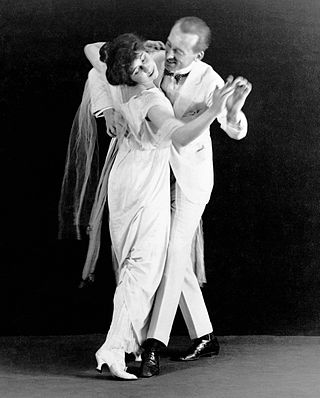
Vernon and Irene Castle were a husband-and-wife team of ballroom dancers and dance teachers who appeared on Broadway and in silent films in the early 20th century. They are credited with reviving the popularity of modern dancing. Castle was a stage name: Vernon was born William Vernon Blyth in England. Irene was born Irene Foote in the United States.

Of Mice and Men is a 1992 American period drama film based on John Steinbeck's 1937 novella of the same name and is the fourth film adaptation of the novella. The first was the 1939 film of the same name, the second was in 1968, the third was in 1981, and the fourth was in 1992. Directed and produced by Gary Sinise, the film features Sinise as George Milton, alongside John Malkovich as Lennie Small, with Casey Siemaszko as Curley, John Terry as Slim, Ray Walston as Candy, Joe Morton as Crooks, and Sherilyn Fenn as Curley's wife.

Neal Shaw Blaisdell served as Mayor of Honolulu from 1955 to 1969 as a member of the Hawaii Republican Party. As chief executive of the City and County of Honolulu, Hawaii, he oversaw one of the largest construction booms in city and county history, working closely with Governor John A. Burns. Blaisdell was the sitting mayor when Hawaii became the 50th U.S. state on August 21, 1959.

The Black Crook is a work of musical theatre first produced in New York City with great success in 1866. Many theatre writers have cautiously identified The Black Crook as the first popular piece that conforms to the modern notion of a musical. The book is by Charles M. Barras. The music, selected and arranged by Thomas Baker, consists mostly of adaptations, but it included some new songs composed for the piece, notably "You Naughty, Naughty Men". The story is a Faustian melodramatic romantic comedy, but the production became famous for its spectacular special effects and skimpy costumes.

Ned Wayburn(néEdward Claudius Weyburn; 30 March 1874 – 2 September 1942) was an American choreographer.
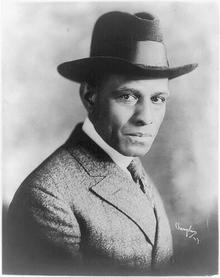
Charles Sidney Gilpin was a stage actor of the 1920s. He played in two New York City debuts: the 1919 premier of John Drinkwater's Abraham Lincoln and the lead role of Brutus Jones in the 1920 premiere of Eugene O'Neill's The Emperor Jones. In 1920, he was the first black person to receive The Drama League's annual award as one of ten people who had done the most that year for American theatre. He also appeared in films.
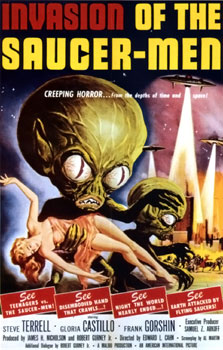
Invasion of the Saucer Men, is a 1957 black-and-white comic science fiction/comedy horror film produced by James H. Nicholson for release by American International Pictures. The film was directed by Edward L. Cahn and stars Stephen Terrell, Gloria Castillo, Raymond Hatton and Frank Gorshin.
MaKee Kalaikinipeakapalekaikalawaiaopuna Blaisdell, also known as Blaizdell or Blaisdell Makee, was an American actor on television, film, and stage. He was best known for playing Sergeant Alika, a recurring character in the television series Hawaiian Eye. He also played the title character in the short film Johnny Lingo (1969), which was part of the LDS Seminary curriculum for many years.
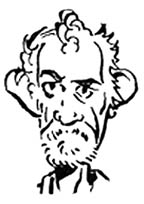
Philip Eustice Blaisdell, better known as Tex Blaisdell, was an American comic-strip artist and comic-book editor. He worked on 22 syndicated features, including Little Orphan Annie, which he drew for five years.

Ernest Terah Hooley was an English financial fraudster. He achieved wealth and fame by buying promising companies and reselling them to the public at inflated prices, but a prosecution exposed his deceitful practices. He was made bankrupt four times and served two prison terms.

The Joker is a comic book series published by DC Comics starring the supervillain the Joker. It ran for nine issues from May–June 1975 to September–October 1976, with a tenth previously unpublished issue released in October 2019.
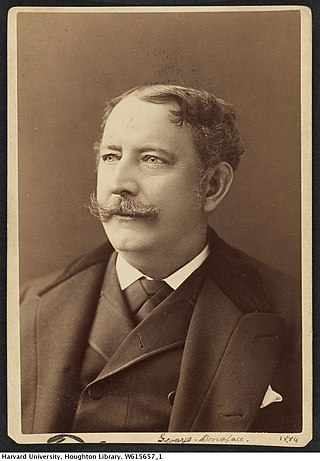
George C. Boniface was an American actor. He made his professional debut in Baltimore in 1851, and remained in the profession for sixty years. Among his best-known roles was as Rodolphe in the original production of The Black Crook (1866). In 1901 he portrayed Dr. Steinart in The Climbers at the Bijou Theatre. One of his last appearances was in New York with Ethel Barrymore in Mid-Channel in 1909.

McVicker's Theater (1857–1984) was a playhouse in Chicago, Illinois, United States. Built for actor James Hubert McVicker, the theater was the leading stage for comedic plays in Chicago's early years. It often hosted performances by Edwin Booth, who married McVicker's daughter and was once targeted there in an attempted murder. Adler & Sullivan designed a remodel in 1883. Although destroyed in two fires, including the Great Chicago Fire, McVicker's remained an operating theater until 1984. It was demolished the next year.

Vida Whitmore, later Vida L. W. Hudson, was an American musical theatre actress, businesswoman, and major benefactor of Columbia University.

William D. Corbett, known professionally as 'Will' Corbett, was an early American silent film and stage actor, who appeared in over a dozen silent movies from 1911 to 1929. He is best remembered by film historians and enthusiasts for his portrayal of 'Uncle Sam' in the 1920 political drama film, Uncle Sam of Freedom Ridge, directed by George Beranger.



















